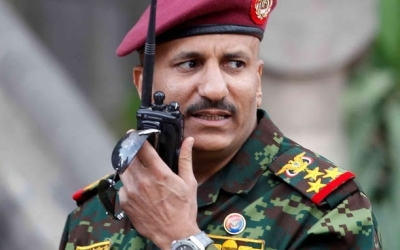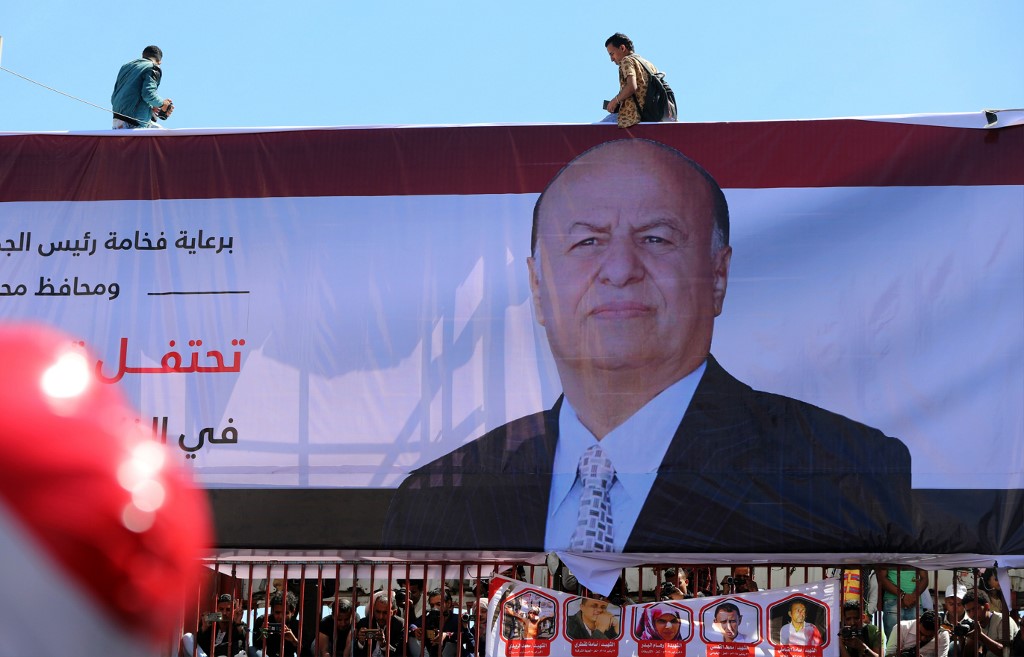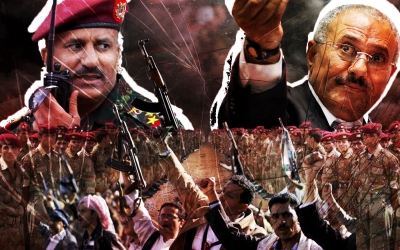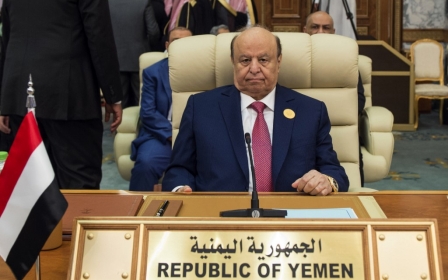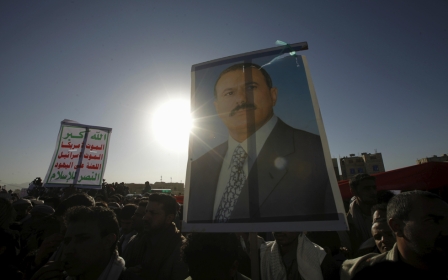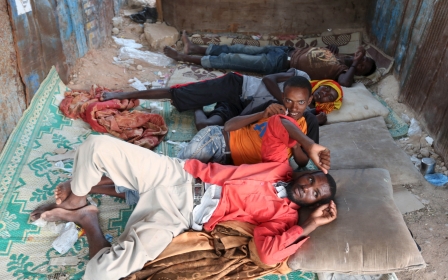Long the enemy, Emirati cash is buying Tareq Saleh new friends in Taiz
Memories of misrule, crackdowns and siege lie deep in the southwestern Yemeni province of Taiz, with the name "Saleh" long evoking animosity from its residents. Or, at least, it used to.
Today, impoverished Yemenis in Taiz are joining the ranks of Tareq Saleh, a man seen by many as responsible for hundreds of deaths in the province. They are joining him for one reason: Emirati money.
As nephew of Ali Abdullah Saleh, Yemen's longtime autocrat removed by a popular uprising in 2012, Tareq has a reputation as part of a regime that had many enemies in Taiz, particularly among supporters of the Islah party, a local heavyweight that manages to be both a Saudi client and an Emirati enemy.
Violence, too, has left its stain. Tareq is accused of leading a deadly crackdown on anti-Saleh protests in 2011, and later served in his uncle's ranks as the deposed president in 2014 allied with the Houthi movement against the government and began Yemen's ongoing war, which has devastated Taiz.
Today, impoverished Yemenis in Taiz are joining the ranks of Tareq Saleh... They are joining him for one reason: Emirati money
A 2017 attempt by Ali Abdullah Saleh to switch sides and support Yemen's government and Saudi- and Emirati-led coalition instead saw him dramatically killed by the Houthis.
New MEE newsletter: Jerusalem Dispatch
Sign up to get the latest insights and analysis on Israel-Palestine, alongside Turkey Unpacked and other MEE newsletters
Gathering the remnants of his uncle's forces, Tareq Saleh headed southwest. Handed arms and cash by new patrons Saudi Arabia and the UAE, he established the well-trained National Resistance Forces (NRF), primarily made up of former members of the Yemeni Republican Guard.
That never sat well with Islah and the people of Taiz, though for long Tareq's activities were restricted to the western coast around Mocha. But increasingly the RSF is found around Taiz, with attractively high salaries drawing new fighters every day.
Though this cash has helped wipe the slate clean for many, Islah's animosity has remained unchanged, and competition between the two forces has already spilled out into open conflict between parties ostensibly now on the same side.
The rule of money
The salaries of NRF fighters are 10 times those of soldiers in the Yemeni army. The prospect of higher salaries has prompted thousands of fighters supporting exiled President Abd Rabbuh Mansour Hadi to leave Houthi-controlled areas, along with their families, to join the National Resistance.
Most of them now live in al-Turbah, a town in rural Taiz that lies on the strategic main road between the eponymous provincial capital and the port city of Aden.
“We are fighting the Houthis on the western coast to liberate Yemen, but al-Turbah is a good place to live in," Ali al-Ansi, an NRF leader, told Middle East Eye.
Ansi, originally from Dhamar, has several military vehicles and stores a small number of weapons in the basement of his house without any opposition from the town's residents. His rent is expensive, but his landlord has no problem with the arms.
He says that this kind of acceptance is not found in Aden and Lahj, because southerners do not welcome northerners keeping weapons in their neighbourhoods.
"I'm using the military vehicles and weapons to fight the Houthis on the western coast and what is stored in al-Turbah is only a part of what we may need on other fronts," Ansi said.
Since the NRF has replaced Sudanese and Emirati forces on the western coast, its fighters receive their salaries in Saudi riyals, unlike government fighters, who get paid in local currency.
"If there is anyone who wants to join the battles with us, he is more than welcome, and he will receive his salary from the first month," Ansi said.
Moreover, the NRF hires guards and drivers from among the local population, thus attracting new supporters and encouraging residents to become more amenable to the group's presence in their areas, despite their initial animosity.
NRF fighters pay high rents, though, with some paying double the going rate.
"The landlords increased their rents, but we pay as per their request. We are displaced people, and we are not happy to pay high rents," Ansi said. "Our sin is that we are trying to reduce the suffering of people in rural areas."
These developments have forced the pro-Islah military police in Taiz city to send reinforcements to impose restrictions on the movement of Saleh's forces in al-Turbah.
Protests
As a result, the NRF and their supporters in Taiz took to the streets in al-Turbah last weekend, demanding the withdrawal of the new military camps, most of which are linked to Islah forces in the area.
The Nasserist Unionist Party and the General People's Congress, Ali Abdullah Saleh's party, took part in the protests, where they raised photos of Tareq for the first time in Taiz since 2011.
This was a shock not only to Saleh's opponents in Taiz but also to independent people who remember the opposition of the Nasserist Unionist Party, Islah's one-time ally, to the NRF.
"Islahi forces have fought Nasserist forces on several fronts and today they want to take over al-Turbah, so we went to the streets to say 'stop' to the militia," Mubarak Alwan, a member of the Nasserist group told MEE.
"We went to the streets against Tareq in the past, but today we are aligned against Islah so we will support him until we save Taiz from Islahi militias."
Clashes broke out between Saleh supporters and the Nasserists on the one hand, and the Islah-backed military police on the other.
Alwan said he is not a fighter, but he recently started supporting Saleh after he saw that his fighters are loyal to the country and accept anyone into their ranks.
"There is no discrimination among Tareq's forces, and you can find fighters from everywhere and different parties, but Islahis only accept their members," he said.
'We went to the streets against Tareq in the past, but today we are aligned against Islah'
- Mubarak Alwan, Nasserist Unionist Party
While fierce clashes stopped on Sunday, forces on both sides are still spread out in al-Turbah, and fighting has broken out again sporadically.
The tension between UAE-backed forces and Islahi fighters in Taiz is not new, but the major development is the intervention of the NRF forces.
Saeed,29, has no fighting experience, but he joined the battles with the NRF after encouragement from his father, who is anti-Islah.
"People in Taiz used to hate Tareq, but Islah is worse than him, so people are supporting the Republican Guards to take revenge on Islah, which is destroying Taiz city," Saeed told MEE.
There are several groups in Taiz under the command of Islah, but people have accused the party of failing to "save the city" from Houthi rebels, who control its north, including the province's three main roads.
"The weapons of the Republican Guards shoot only at the Houthis, but the Islah militias spread in cities to collect the taxes and fight over it," Saeed said.
Saeed knows that Tareq Saleh's forces fought alongside the Houthis, but he believes that what took place after his uncle's death is different from before it.
"All parties and groups have a dark history, so we deal with people according to current attitudes," he said.
Loyalties
Islah is loyal to Hadi and represents the government in Taiz, but it is difficult for the party to impose its decisions on all parties there.
"We consider Tareq's forces to be militias since they are not loyal to the president and they don't have any authority to stay in Taiz," Ahmed, a military police member, told MEE.
"If Tareq's fighters want to fight the Houthis, they can move with their weapons and vehicles to the western coast rather than spreading in the rural areas of Taiz."
Ahmed said that many residents don't want NRF fighters to stay in their villages, but they don't dare to speak up as most of them are civilians and fear military leaders.
"The big question is why do these fighters prefer villages and not cities? It is because they can move freely in villages to store their weapons and attract new fighters," he said.
Not only Saleh's supporters, but all the UAE-backed sides, participated in the recent protest and clashes in al-Turbah, he said.
"It is the UAE's money that is destroying Taiz and the whole country. The UAE succeeded in dividing Taiz's army by its money. Nowadays, we can see new brigades supporting the UAE."
Many Yemenis have lost their jobs during the past five years and have resorted to joining militias in order to provide for their families.
"The UAE-backed forces exploited the poverty of Yemenis, and some needy people join UAE-backed forces for the sake of money," Ahmed said.
"Only fighters who are loyal to their country are still fighting under Hadi's leadership, even if they receive very low salaries."
*With additional reporting from Taiz
Middle East Eye delivers independent and unrivalled coverage and analysis of the Middle East, North Africa and beyond. To learn more about republishing this content and the associated fees, please fill out this form. More about MEE can be found here.


